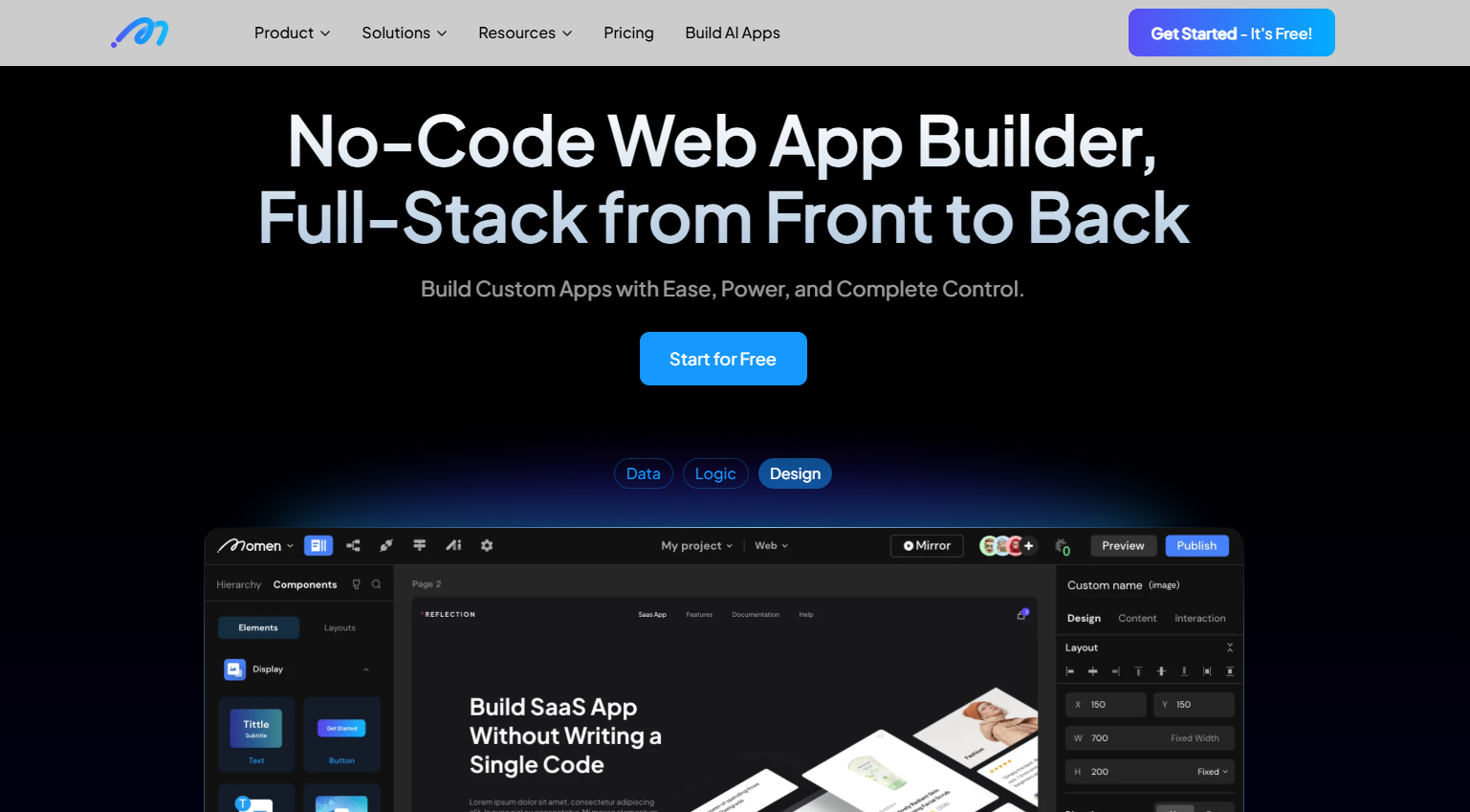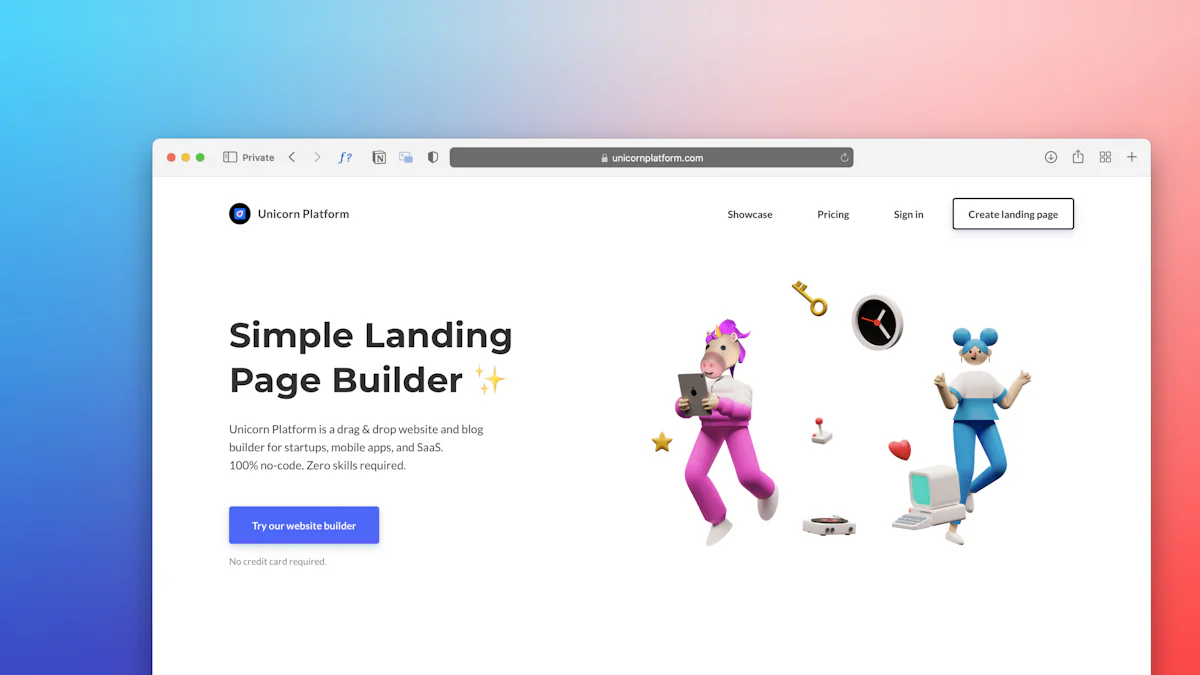Softr Review: Can It Handle Scalable Applications Effectively?
Softr offers a user-friendly solution for building web and progressive web apps quickly. It empowers you to create applications without writing a single line of code, making it ideal for non-technical users. However, when it comes to handling large-scale applications, Softr faces significant challenges.According to Softr's official documentation, the platform is optimized for applications with up to 10,000 monthly active users. Its reliance on pre-built blocks and external databases limits flexibility and scalability. While it excels at creating internal tools and client portals with minimal effort, its performance under heavy loads and lack of native mobile app support make it less suitable for demanding use cases. While it excels at creating internal tools and client portals with minimal effort, applications may experience response times of 2-5 seconds under heavy loads, and the lack of native mobile app support makes it less suitable for mobile-first projects.
What is Softr?
Overview of Softr
Softr empowers you to build web and progressive web apps (PWAs) without writing a single line of code. It simplifies the app creation process by offering a drag-and-drop editor that allows you to design and customize applications effortlessly. You can choose from a wide range of pre-built templates tailored for various use cases, saving you time and effort. These templates provide a strong foundation, enabling you to focus on functionality rather than starting from scratch.
Softr also integrates AI tools to enhance your app-building experience. These tools assist in automating repetitive tasks and generating app components quickly. Whether you need a customer portal, an internal tool, or a marketplace, Softr provides the flexibility to create web applications that suit your needs.Target Audience for Softr
Softr caters to a diverse audience, making it an excellent choice for non-technical users, small to medium-sized businesses, and freelancers. If you lack coding skills but want to create functional and visually appealing apps, this platform is designed for you. Entrepreneurs and startups also benefit from its simplicity, as it allows them to launch applications quickly without hiring developers.
The platform excels in building internal tools, client portals, and spreadsheet-backed apps. For example, you can transform your Airtable or Google Sheets data into fully functional web applications. This feature is particularly useful for businesses that rely on spreadsheets for managing projects, tracking customer data, or organizing workflows. Softr’s ability to integrate with these tools ensures a seamless transition from static data to dynamic applications.
Strengths of Softr for Scalable Applications

Ease of Use in No-Code Platform
By focusing on ease of use and versatility, Softr positions itself as a go-to solution for individuals and organizations looking to create web applications without the complexity of traditional development. It adopts a widget-first philosophy, emphasizing immediate usability through pre-built blocks with focused configuration options. This approach makes it particularly effective for rapid deployment of internal tools and basic business applications.
Integration Capabilities of Softr
Softr provides integration capabilities with essential data sources including Airtable, Google Sheets, and Supabase, enabling direct connection to existing business data. The platform supports standard business tools like Zapier, Stripe, and MailChimp, facilitating basic workflow automation, payment processing, and marketing functionalities. This feature is particularly useful for businesses that rely on spreadsheets or external databases to manage their operations.
Rapid Development with Softr
Softr streamlined approach centers on providing pre-built components specifically designed for creating interfaces with existing data sources. This makes it particularly suitable for teams needing quick deployment of internal tools or basic client portals where rapid implementation takes priority over extensive customization.
Weaknesses of Softr for Scalable Applications
Scalability Challenges in the Softr No-Code Platform
Softr struggles to maintain consistent performance when handling large-scale applications. If your app requires more than 20 concurrent users, you may encounter significant performance bottlenecks. This limitation can disrupt user experience, especially for customer-facing applications that demand high reliability.
High latency further compounds these issues. Under heavy loads, response times can stretch up to 10 seconds. Such delays make it difficult to deliver scalable customer-facing products or meet the expectations of modern users. For businesses aiming to grow their user base or expand their operations, these performance characteristics can hinder progress.
Reliance on External Databases in Softr
Softr relies heavily on external databases like Airtable and Google Sheets. While this approach simplifies integration, it introduces challenges for scalability. Each request from your app must travel through Softr’s servers, then to the external database, and back again. This multi-step process increases latency and reduces app performance, particularly for data-intensive applications.
The absence of a built-in database limits your control over data management. External solutions often lack the optimization needed for scalable customer-facing products. If your business scale grows, this reliance on third-party tools can restrict flexibility through architecture and create inefficiencies in your development environment.
Limited Design and Technical Flexibility in Softr
Softr’s pre-built components simplify app creation but restrict customization. If you need advanced features or unique designs, the platform’s limited flexibility can become a roadblock. For example, you cannot implement GraphQL APIs or build complex workflow engines, which are essential for many large-scale applications.
This lack of technical depth makes it challenging to adapt the platform to specific business needs. While Softr excels at creating simple tools like a softr client portal, it falls short when you require a highly tailored solution. For developers or businesses seeking robust customization options, these cons may outweigh the pros.
Compliance and Security Limitations of Softr
Softr struggles to meet the compliance and security standards required for certain industries. For instance, it is not HIPAA-compliant, which makes it unsuitable for healthcare applications that handle sensitive patient data. If your business operates in a regulated industry, this limitation could pose serious challenges.
Additionally, Softr lacks enterprise-grade security features. It does not offer advanced options like role-based access control or end-to-end encryption for data. These missing features can leave your applications vulnerable to security breaches, especially as your user base grows. In contrast, platforms like Momen excel in providing robust security measures, making them a better choice for scalable and secure applications.
For businesses prioritizing compliance and security, Softr’s cons outweigh its benefits. Its reliance on external databases further complicates data protection, as each request passes through multiple servers. This architecture increases the risk of data exposure and latency, making it less reliable for high-scale applications requiring stringent security protocols.
Comparison with Alternatives
Momen vs Softr
Momen stands out as a robust platform for building large-scale applications. Its performance capabilities surpass those of Softr, especially when handling high user concurrency. Momen’s architecture ensures smooth operation even under heavy loads, making it ideal for businesses that prioritize reliability. Unlike Softr, which struggles with latency issues, Momen delivers faster response times, ensuring a seamless user experience.

Momen also offers advanced technical features that give you greater control over your app development. For instance, it supports custom APIs and workflow engines, enabling you to create highly tailored solutions. Additionally, Momen provides enterprise-grade security, which includes features like role-based access control and end-to-end encryption. These measures make it suitable for industries requiring stringent compliance, such as healthcare or finance.
If your goal is to build large-scale applications with exceptional performance and advanced customization, Momen is a better choice than Softr. It caters to businesses that need scalable, secure, and feature-rich applications.
Bubble vs Softr
Bubble offers a more versatile solution for creating complex applications. Unlike Softr, Bubble includes a built-in database, which eliminates the need for external data sources. This feature improves performance by reducing latency and streamlining data management. If your app requires intricate workflows or dynamic data handling, Bubble provides the tools to meet those needs.
Customization is another area where Bubble excels. While Softr relies on pre-built blocks, Bubble allows you to design every aspect of your app from scratch. This flexibility makes it ideal for businesses that need unique features or branding. Bubble also integrates AI-powered tools, which simplify tasks like predictive analytics and user behavior tracking.
For complex, web-based applications, Bubble outshines Softr. It gives you the freedom to build highly customized solutions without compromising on performance or scalability.
Adalo vs Softr
Adalo focuses on mobile-first development, making it a strong alternative to Softr for creating native mobile applications. Unlike Softr, which limits you to progressive web apps (PWAs), Adalo enables you to publish directly to app stores like Google Play and the Apple App Store. This capability expands your reach and enhances user engagement.
Adalo also includes a built-in database, which simplifies data management and improves performance. You can create mobile applications with features like push notifications, offline access, and deep integration with device functionalities. These features make Adalo a better choice for businesses targeting mobile users.
If your priority is mobile app development with app store publishing, Adalo offers a more comprehensive solution than Softr. It combines ease of use with the ability to create feature-rich, native mobile applications.
When Softr is a Better Choice
Rapid development of simple internal tools and client portals
Softr shines when you need to create straightforward applications quickly. Its drag-and-drop editor and pre-built templates allow you to build functional tools without technical expertise. For example, if your business requires a project tracker or a customer dashboard, Softr provides the tools to get started in hours rather than weeks. You can focus on functionality while the platform handles the technical complexities.
The platform’s simplicity makes it ideal for internal tools like CRMs or employee management systems. These applications often don’t require advanced features or high scalability. Softr’s block-based design ensures that you can create visually appealing and user-friendly interfaces without hiring developers. This approach saves time and reduces costs, especially for small businesses or startups.
For client portals, Softr offers features like secure file sharing, user authentication, and data visualization. You can integrate external databases to display real-time information, making it easier to manage client relationships. While it may not handle heavy traffic well, it performs reliably for smaller user bases. This reliability makes it a practical choice for businesses with limited scalability needs.
Users with existing databases and minimal scalability needs
If you already rely on tools like Airtable or Google Sheets to manage your data, Softr can transform these static spreadsheets into dynamic web applications. The platform integrates seamlessly with external databases, allowing you to leverage your existing data infrastructure. This capability eliminates the need to migrate data, simplifying the development process.
For businesses with minimal scalability requirements, Softr provides a cost-effective solution. Its reliance on external databases works well for applications with light data loads and low user concurrency. For instance, a small team managing internal workflows or a boutique agency creating client dashboards can benefit from Softr’s capabilities without encountering performance issues.
However, it’s essential to consider the platform’s limitations. Softr does not include a built-in database, which means you depend on third-party solutions for data storage. This reliance can introduce latency and reduce control over data management. For projects requiring high scalability or advanced security, this architecture may not suffice. But for simpler use cases, it offers a balance between functionality and ease of use.
Note: Softr is not suitable for industries requiring strict compliance, such as healthcare. It lacks HIPAA compliance, which is essential for handling sensitive health information. If your project involves regulated data, you should explore platforms designed to meet these standards.

Softr provides a user-friendly platform for building apps, especially for small to medium-scale needs. Its intuitive drag-and-drop interface and pre-built templates make it ideal for creating internal tools and client portals quickly. However, when handling large-scale applications, Softr struggles with app performance and scalability. If your project demands high reliability or advanced customization, platforms like Momen or Bubble offer better solutions. Before choosing, evaluate your specific requirements, including scalability and performance needs, to ensure the platform aligns with your goals.
FAQ
Can Softr handle large-scale applications?
Softr struggles with scalability for large-scale applications. It performs well for small to medium-sized projects but faces challenges like performance bottlenecks and high latency when handling more than 20 concurrent users. If your app requires high reliability or supports a large user base, you may need to explore other platforms.
What types of databases can I integrate with Softr?
Softr integrates with external databases such as Airtable, Google Sheets, and Supabase. These integrations allow you to connect your existing data to your applications. However, Softr does not include a built-in database, which may limit scalability and control over data management.
Is Softr suitable for industries with strict compliance requirements?
Softr is not ideal for industries requiring strict compliance, such as healthcare. It lacks HIPAA compliance and enterprise-grade security features like end-to-end encryption. If your project involves sensitive data or regulated industries, consider platforms designed for higher security standards.
How customizable are Softr applications?
Softr applications rely on pre-built blocks, which simplify development but limit customization. You can create functional and visually appealing apps, but advanced features like custom APIs or complex workflows are not supported. For highly tailored solutions, platforms like Momen and Bubble offer more flexibility.
What are the main use cases for Softr?
Softr works best for creating internal tools, client portals, and spreadsheet-backed apps. For example, you can build a project tracker, CRM, or a client dashboard using its drag-and-drop editor and pre-built templates. These use cases are ideal for businesses with minimal scalability needs.
How does Softr compare to other no-code platforms?
Softr excels in ease of use and rapid development but falls short in scalability and customization. Platforms like Bubble provide more flexibility and built-in databases, while Adalo supports native mobile app development. Momen offers better performance and security for large-scale applications.
Can I use Softr for free?
Softr offers a free plan with limited features, making it a good starting point for small projects. However, advanced features like custom domains, integrations, and higher usage limits require a paid subscription. Review the pricing plans to determine which one fits your needs.
What are the limitations of Softr?
Softr has several limitations, including scalability challenges, reliance on external databases, lack of native mobile app support, and limited customization options. These factors make it less suitable for complex or large-scale applications. Evaluate your project requirements carefully before choosing Softr.
See Also
Selecting The Ideal No-Code Platform For Business Growth
Comparing Bubble, Softr, And Momen: No-Code Showdown 2025
Is No-Code Capable Of Supporting Business Expansion?
Creating An Affordable No-Code Full-Stack Development Solution
Exploring Our Choice Of PostgreSQL For No-Code Development
